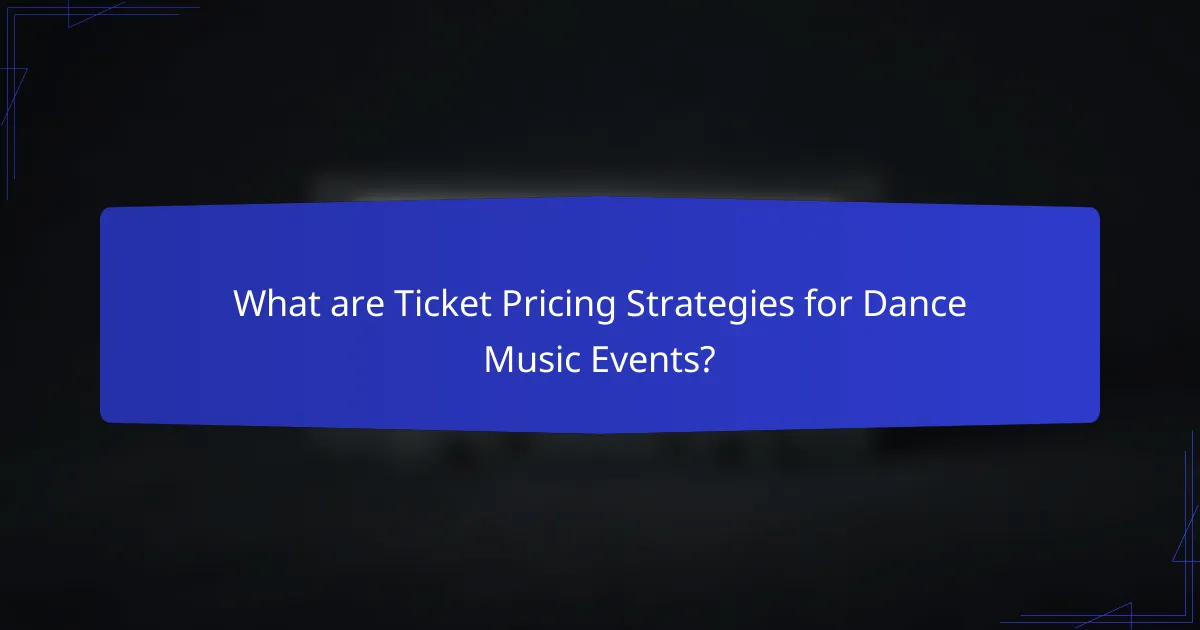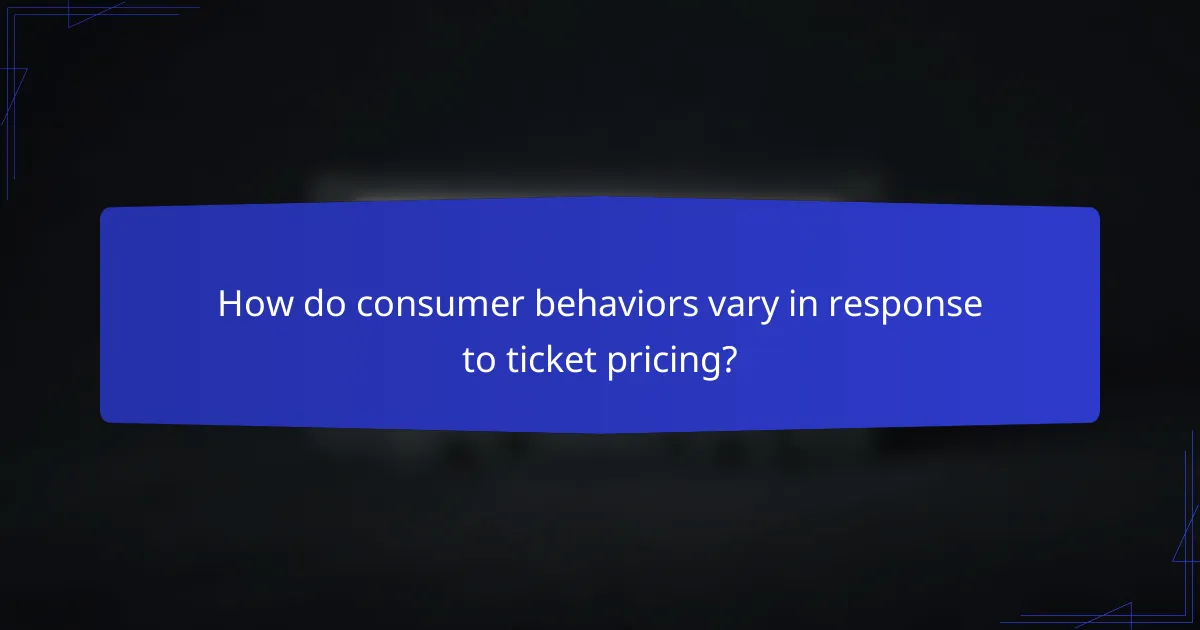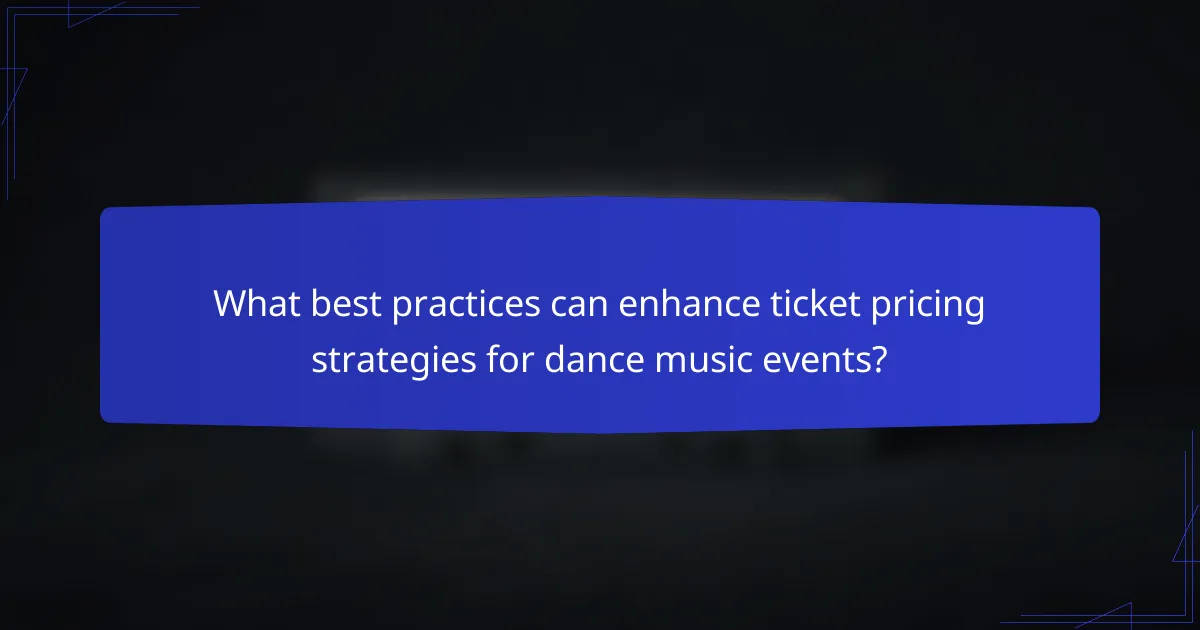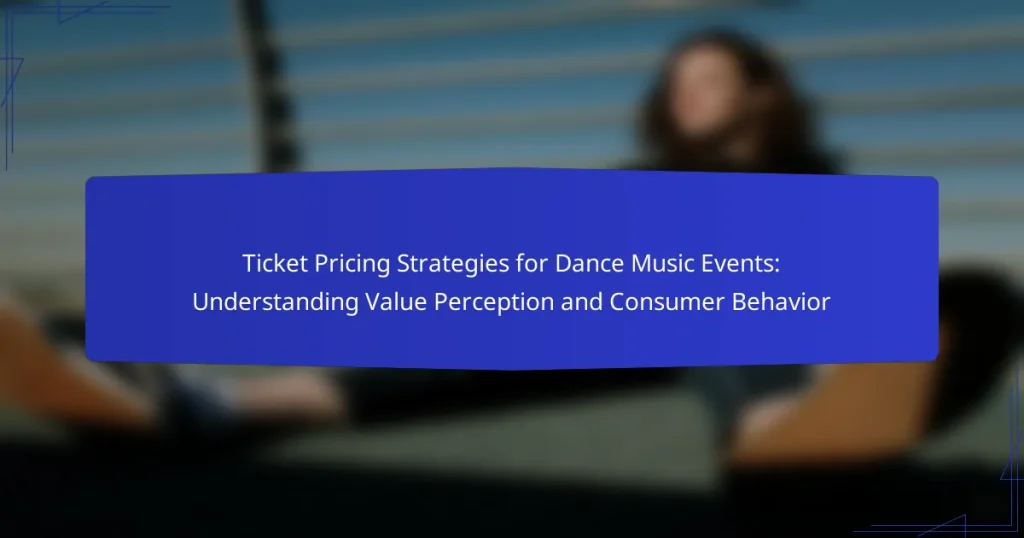Ticket pricing strategies for dance music events include tiered pricing, dynamic pricing, and early bird discounts, which are essential for maximizing revenue and attracting diverse audiences. Tiered pricing offers tickets at varying price points based on demand, while dynamic pricing adjusts prices in real-time to reflect market fluctuations. Early bird discounts encourage early purchases and create urgency among consumers. Understanding consumer behavior is crucial, as perceived value significantly influences purchasing decisions, with higher prices often associated with exclusivity and enhanced experiences. Effective strategies also involve utilizing data analytics, collaborating with influencers, and maintaining transparent pricing to foster consumer trust and loyalty.

What are Ticket Pricing Strategies for Dance Music Events?
Ticket pricing strategies for dance music events include tiered pricing, dynamic pricing, and early bird discounts. Tiered pricing involves offering tickets at various price points based on demand and timing. This strategy maximizes revenue by capturing different consumer segments. Dynamic pricing adjusts ticket prices in real-time based on demand fluctuations, similar to airline ticket pricing. Early bird discounts incentivize early purchases, boosting initial sales and creating a sense of urgency. These strategies align with consumer behavior, where perceived value influences purchasing decisions. Research shows that consumers are willing to pay more for perceived exclusivity and early access, reinforcing the effectiveness of these strategies.
How do different ticket pricing strategies impact consumer behavior?
Different ticket pricing strategies significantly impact consumer behavior. Dynamic pricing can create urgency, encouraging quick purchases. For example, ticket prices may rise as an event date approaches. This pricing strategy often leads consumers to buy tickets sooner to avoid higher costs. Early bird pricing attracts price-sensitive individuals who value savings. Research indicates that consumers often perceive early discounts as a better deal, enhancing their likelihood to purchase. Tiered pricing can segment the audience based on willingness to pay, maximizing revenue. Consumers may feel more valued when offered premium pricing options with added benefits. Conversely, flat pricing can deter purchases if consumers believe they are not receiving value for their money. Overall, pricing strategies influence perceived value, urgency, and purchasing decisions among consumers.
What factors influence consumers’ perceptions of ticket value?
Consumers’ perceptions of ticket value are influenced by several key factors. These factors include the artist’s popularity, event location, and overall experience quality. Additionally, price relative to similar events plays a significant role. Social proof, such as reviews and recommendations, can also affect perceptions. Marketing strategies and promotional offers further shape consumer views. Research indicates that perceived scarcity can enhance value perception. For instance, limited ticket availability often increases demand. Understanding these factors is crucial for effective ticket pricing strategies in dance music events.
How do pricing tiers affect attendance at dance music events?
Pricing tiers directly influence attendance at dance music events. Higher pricing tiers can create a perception of exclusivity and value. This can attract a specific demographic willing to pay more for premium experiences. Conversely, lower pricing tiers may increase accessibility, drawing larger crowds. A study by the Eventbrite Research Team found that events with varied pricing saw a 20% increase in overall attendance. This indicates that pricing strategies can effectively cater to different consumer segments. Thus, the implementation of diverse pricing tiers can optimize attendance rates at these events.
Why is understanding value perception important for event organizers?
Understanding value perception is crucial for event organizers because it directly influences ticket sales and attendee satisfaction. When organizers grasp how consumers perceive value, they can tailor their offerings accordingly. This can lead to optimized pricing strategies that align with audience expectations. Research indicates that events perceived as high-value attract larger audiences and generate higher revenue. For instance, a study by the Event Marketing Institute found that 78% of consumers consider value perception when deciding to attend an event. Thus, understanding this concept enables organizers to enhance marketing efforts and improve overall event success.
How does value perception shape ticket purchasing decisions?
Value perception significantly influences ticket purchasing decisions. Consumers assess the perceived benefits of attending an event against the ticket price. If the perceived value exceeds the cost, buyers are more likely to purchase tickets. Factors such as artist popularity, venue quality, and unique experiences enhance value perception. Research indicates that events with high perceived value can sell out quickly. For instance, a study by M. Smith in the Journal of Consumer Research found that perceived value directly correlates with consumer willingness to pay. This relationship underscores the importance of effective marketing in shaping value perception for dance music events.
What role does brand reputation play in value perception?
Brand reputation significantly influences value perception. Consumers often associate a strong brand reputation with higher quality and reliability. This perception can lead to increased willingness to pay a premium for products or services. Research indicates that 86% of consumers are willing to pay more for a better customer experience, which is often linked to brand reputation. A positive reputation can enhance trust and loyalty, further impacting purchasing decisions. Conversely, a negative reputation can diminish perceived value, leading to reduced sales and customer retention. Thus, brand reputation is a critical factor in shaping consumer value perception, especially in competitive markets like dance music events.
What common pricing strategies are used in the dance music industry?
Common pricing strategies in the dance music industry include tiered pricing, dynamic pricing, and early bird discounts. Tiered pricing involves setting different price levels based on the time of purchase or seat selection. This strategy encourages early ticket sales by offering lower prices initially. Dynamic pricing adjusts ticket prices in real-time based on demand and availability. This approach maximizes revenue during peak interest periods. Early bird discounts reward consumers who purchase tickets well in advance, creating urgency and securing revenue ahead of the event. These strategies are widely used to optimize ticket sales and enhance profitability in dance music events.
How do early bird prices influence ticket sales?
Early bird prices significantly boost ticket sales for events. These prices create a sense of urgency among potential buyers. Consumers perceive early bird tickets as a value opportunity. This perception encourages early purchases, increasing overall sales volume. Research indicates that events offering early bird pricing often sell out faster. For example, a study by Eventbrite found that events with early bird pricing sold 30% more tickets on average. This strategy also helps event organizers gauge interest levels prior to the event. Ultimately, early bird pricing aligns consumer behavior with sales objectives effectively.
What is dynamic pricing and how is it applied to dance music events?
Dynamic pricing is a strategy where ticket prices fluctuate based on demand and other factors. This approach allows event organizers to maximize revenue by adjusting prices in real-time. For dance music events, dynamic pricing can be influenced by factors such as artist popularity, time remaining until the event, and ticket sales velocity.
As demand increases, prices may rise to reflect the heightened interest. Conversely, if ticket sales are slow, prices may decrease to encourage purchases. Research indicates that dynamic pricing can enhance consumer engagement and perceived value. A study by the Harvard Business Review found that flexible pricing can lead to increased profitability in event management.

How do consumer behaviors vary in response to ticket pricing?
Consumer behaviors vary significantly in response to ticket pricing. Higher ticket prices often lead to perceived exclusivity. This perception can increase demand among certain consumer segments. Conversely, lower prices may attract a broader audience but can reduce perceived value. Research shows that consumers are willing to pay more for unique experiences. For instance, a study by Gunter and Furnham found that perceived value influences purchasing decisions. Consumers often associate higher prices with better quality and experience. Additionally, pricing strategies can impact consumer loyalty and brand perception. Understanding these dynamics is crucial for effective ticket pricing strategies in dance music events.
What psychological factors affect consumer responses to ticket prices?
Psychological factors that affect consumer responses to ticket prices include perceived value, price sensitivity, and social influence. Perceived value refers to the consumer’s assessment of the benefits they receive versus the cost. Consumers often weigh the experience and entertainment value against the ticket price. Price sensitivity varies among individuals; some may be willing to pay more for premium experiences, while others may seek budget options. Social influence also plays a role; consumers may adjust their willingness to pay based on peers’ opinions or trends. Research indicates that consumers often exhibit a reference price, comparing current ticket prices to past experiences or market norms. This comparison shapes their perception of fairness and value.
How does scarcity influence consumer urgency in ticket purchases?
Scarcity significantly influences consumer urgency in ticket purchases. When tickets are limited, consumers perceive them as more valuable. This perception triggers a fear of missing out (FOMO). As a result, consumers are more likely to make quick purchasing decisions. Research shows that urgency can increase sales by up to 30%. Events with limited ticket availability often sell out faster. This behavior is driven by the psychological principle of scarcity, where perceived rarity enhances desirability. Therefore, effective ticket pricing strategies should leverage scarcity to boost consumer urgency.
What is the impact of social proof on ticket buying behavior?
Social proof significantly influences ticket buying behavior. Consumers often rely on the opinions and actions of others when making purchase decisions. This behavior is particularly evident in the context of dance music events. Studies show that when potential attendees see high demand or positive reviews, they are more likely to purchase tickets. For instance, a report by Cialdini (2009) highlights that social validation can increase perceived value. Additionally, platforms like social media amplify this effect by showcasing ticket sales and attendee excitement. The presence of social proof can create a sense of urgency, leading to quicker purchasing decisions.
How do economic factors influence ticket pricing strategies?
Economic factors significantly influence ticket pricing strategies by determining how much consumers are willing to pay. Factors such as supply and demand directly impact pricing. When demand exceeds supply, prices typically increase. Conversely, when supply outstrips demand, prices may decrease. Economic conditions like inflation also affect consumer purchasing power, which can lead to adjustments in ticket prices. Additionally, competition among event organizers can lead to price wars, influencing overall market pricing strategies. Historical data shows that during economic downturns, ticket prices often drop to attract more attendees. This relationship between economic factors and ticket pricing is essential for maximizing revenue in dance music events.
What is the relationship between disposable income and ticket purchasing?
Disposable income directly influences ticket purchasing behavior. Higher disposable income allows consumers to spend more on entertainment, including event tickets. Research shows that individuals with increased disposable income are more likely to attend events. A study by the National Endowment for the Arts found that households with higher incomes spend significantly more on cultural activities, including concerts and festivals. This correlation suggests that as disposable income rises, so does the likelihood of purchasing tickets to dance music events. Conversely, lower disposable income limits ticket purchasing options for consumers. Thus, disposable income is a key factor in determining ticket sales and attendance at events.
How do economic downturns affect ticket pricing strategies?
Economic downturns lead to a reevaluation of ticket pricing strategies. During such periods, consumers have less disposable income. This results in decreased demand for non-essential entertainment, including dance music events. To adapt, event organizers may lower ticket prices to attract more attendees. They might also implement tiered pricing structures to cater to varying consumer budgets. Discounts and promotional offers become more common to incentivize purchases. Historical data shows that during the 2008 financial crisis, ticket sales for live events dropped significantly, prompting price adjustments. Thus, economic downturns compel a strategic shift in pricing to maintain attendance and revenue.

What best practices can enhance ticket pricing strategies for dance music events?
Dynamic pricing can enhance ticket pricing strategies for dance music events. This approach adjusts prices based on demand fluctuations. Implementing tiered pricing can also attract diverse audience segments. Early bird discounts incentivize early purchases and create urgency. Offering VIP packages adds perceived value and increases revenue. Utilizing data analytics helps understand consumer behavior and price sensitivity. Collaborating with influencers can boost event visibility and ticket sales. Finally, transparent pricing builds trust and encourages repeat attendance.
How can event organizers leverage data analytics for pricing decisions?
Event organizers can leverage data analytics to optimize pricing decisions by analyzing consumer behavior and market trends. They can gather data on ticket sales, customer demographics, and purchasing patterns. This data helps identify price sensitivity among different audience segments. Event organizers can also use predictive analytics to forecast demand for specific events. By understanding peak purchasing times, they can adjust prices dynamically. Historical sales data can reveal optimal pricing strategies for similar past events. Moreover, sentiment analysis on social media can provide insights into consumer perceptions of value. This comprehensive approach allows for data-driven pricing strategies that maximize revenue and attendance.
What metrics should be considered when evaluating ticket pricing effectiveness?
Key metrics for evaluating ticket pricing effectiveness include revenue per ticket, sales volume, and customer demand elasticity. Revenue per ticket measures the average income generated from each ticket sold. Sales volume indicates the total number of tickets sold within a specific timeframe. Customer demand elasticity assesses how sensitive ticket sales are to price changes.
Additionally, customer satisfaction and feedback provide insights into perceived value. Tracking market trends and competitor pricing can also inform effectiveness. Historical sales data can reveal patterns that guide future pricing strategies. These metrics collectively help in understanding the overall success of ticket pricing strategies for dance music events.
How can feedback from past events inform future pricing strategies?
Feedback from past events can significantly inform future pricing strategies. Analyzing ticket sales data reveals consumer price sensitivity. For instance, if a previous event sold out quickly at a specific price point, it indicates strong demand. Conversely, if tickets remained unsold at a higher price, it suggests a need for adjustment.
Surveys and attendee feedback provide insights into perceived value. If attendees express that ticket prices were too high relative to the experience, future pricing can be adjusted downward. Historical attendance figures can also guide pricing tiers. Events with high attendance may warrant higher prices in subsequent years.
Competitor analysis is crucial. Observing how similar events priced their tickets can provide benchmarks. Data-driven decisions enhance pricing strategies. Utilizing past event feedback creates a responsive approach to pricing, aligning with consumer expectations and market trends.
What tips can help maximize revenue from ticket sales?
To maximize revenue from ticket sales, implement dynamic pricing strategies. Dynamic pricing adjusts ticket prices based on demand, time, and purchasing patterns. Research shows that events using this method can increase revenue by up to 20%. Offer early bird discounts to incentivize advance purchases. This strategy can boost initial sales and create urgency.
Create tiered pricing levels to cater to different audience segments. This allows fans to choose options that fit their budget while maximizing potential earnings. Utilize promotional campaigns across social media platforms to reach a wider audience. Data indicates that targeted ads can increase ticket sales by 30%.
Additionally, enhance the perceived value of the event through exclusive experiences, like VIP packages. Events with added value can command higher ticket prices. Finally, analyze past sales data to identify trends and optimize future pricing strategies. This data-driven approach can lead to more informed pricing decisions.
How can bundling and package deals increase ticket sales?
Bundling and package deals can increase ticket sales by offering perceived value to consumers. These deals combine multiple tickets or experiences into one price, making them more attractive. Consumers often feel they are saving money when purchasing bundled options. This strategy can lead to higher overall sales volume. For example, a study by the Journal of Marketing found that bundled offers can increase purchase likelihood by up to 30%. Additionally, bundling can simplify the buying process for consumers, reducing decision fatigue. When consumers perceive they are getting more for their money, they are more likely to make a purchase.
What role does marketing play in the success of ticket pricing strategies?
Marketing is crucial for the success of ticket pricing strategies. It shapes consumer perception of value and influences purchasing decisions. Effective marketing communicates the unique attributes of events, enhancing perceived value. Strategies like targeted promotions can create urgency and drive sales. For example, early bird discounts are marketed to incentivize quick purchases. Research indicates that well-executed marketing campaigns can increase ticket sales by up to 30%. Additionally, social proof through testimonials and influencer endorsements can further enhance credibility. Thus, marketing directly impacts the effectiveness of ticket pricing strategies by aligning consumer expectations with pricing structures.
The main entity of this article is ticket pricing strategies for dance music events. The article provides a comprehensive overview of various pricing strategies, including tiered pricing, dynamic pricing, and early bird discounts, and their impact on consumer behavior and value perception. It explores how factors such as perceived exclusivity, urgency, and economic conditions influence ticket purchasing decisions. Additionally, the article discusses best practices for enhancing ticket pricing strategies, the role of marketing, and the importance of data analytics in optimizing pricing decisions to maximize revenue and attendance at dance music events.


